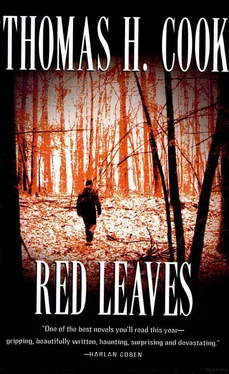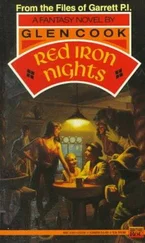Red Leaves
Thomas H. Cook
AN OTTO PENZLER BOOK
A HARVEST BOOK • HARCOURT, INC.
Orlando Austin New York San Diego Toronto London
Copyright © 2005 by Thomas H. Cook
All rights reserved.
For Susan Terner ,
courage under fire
Oh, return to zero, the master said.
Use what's lying around the house.
Make it simple and sad.
—STEPHEN DUNN, " Visiting the Master "
PART I
When you remember those times, they return to you in a series of photographs. You see Meredith on the day you married her. You are standing outside the courthouse on a bright spring day. She is wearing a white dress and she stands beside you with her hand in your arm. A white corsage is pinned to her dress. You gaze at each other rather than the camera. Your eyes sparkle and the air around you is dancing.
Then there are the brief vacations before Keith was born. You are in a raft on the Colorado River, sprayed with white water. There you are, nearly blinded by the autumn foliage of New Hampshire. On the observation deck of the Empire State Building, you mug for the camera, feet spread, fists pressed to waists, like masters of the universe. You are twenty-four and she is twenty-one, and there is something gloriously confident in the way you stand together, sure and almost cocky. More than anything, without fear. Love, you have decided by then, is a form of armor.
Keith appears first in the crook of Meredith's right arm. She is lying in a hospital bed, her face bathed in sweat, her hair in disarray. Keith's small body floats in a swirl of bedding. His face is in profile, and a tiny pink hand instinctively reaches for something his closed eyes cannot see, his mother's loosely covered breast. Meredith is laughing at this gesture, but you recall that she was clearly struck by it, too, thought it a sign of high intelligence or early adventurousness, ambition, the drive to make a mark. You reminded her, joking, that her son was only a few minutes old. Yes, yes, of course, she said.
Here he is at two, unsteady on his feet, toddling toward the stuffed bear your brother, Warren, gave him that Christmas. Warren sits on the sofa, beside Meredith. He is leaning forward, his large pudgy hands blurred because he was clapping when you took the picture, clapping hard and fast, urging Keith forward like a good wind at his back. So lucky, Bro, he will say to you at the door before he leaves, so lucky to have all this.
You often pose before all you have. You stand with Meredith and Keith, who is six now and holds a plastic Wiffle ball bat. You are in front of the little house on Cranberry Way. You bought it on the slimmest of financial credentials, and Meredith predicted the loan would not be approved, and so, when it was, you uncorked a bottle of inexpensive champagne and toasted your new status as homeowners. There's the picture, you and Meredith with glasses raised, Keith standing between you, his six-year-old hand lifted in imitation, holding a glass of apple juice.
You build a business, buy a second, larger, house on a more secluded lot. In that larger house the holidays come and go. You carve turkey and hang ornaments on real trees, then later, fearing fire, on artificial ones. In photographs you wallow in holiday gift wrapping, and as the years pass, the pictures show your face aglow in the light of many birthday candles.
You buy Meredith a ring on your fifteenth anniversary and with Keith and Warren watching, you marry her again, this time writing your own vows. That night, in the bed's comforting darkness, she tells you that she has never stopped loving you, and it is all you can do not to weep.
You buy your son a simple, inexpensive bike for his tenth birthday, then an elaborate twelve-speed when he turns fourteen. He's not particularly mechanical, so you spend some time showing him the gears. After a while, you ask him if he'd prefer a less-complicated bike. He says he would, but that it has nothing to do with the gears. He prefers everything less complicated, he tells you, and the look in his eyes when he says this suggests that there may be hidden depths in him, unexpected complexities. You say nothing of this, however, but later you wonder if your son, the one who'd once rested so securely in the crook of Meredith's arm, has now begun to emerge from the comfortable cocoon you have so carefully woven around him. If so, you are pleased, and you are suns Meredith will be pleased.
Another year passes. Keith is almost as tall as you are, and Meredith has never looked more radiant. A warm satisfaction settles over you, and you realize that it isn't the house or the business that fills you with a sense of accomplishment, ft is your family, the depth and balance it has given to your life, a quiet rootedness and sense of well-being your father never attained and which, for some reason at the end of that summer, you recognize as the crowning victory of your life.
And so you decide to take a photograph. You set up the tripod and call Keith and Meredith outside. You take your place between them, one arm over your son, the other over your wife. You have timed the camera. You see the warning light and draw them close in beside you. Ready now, you tell them—smile.
ONE
F amily photos always lie.
That's what occurred to me when I left my house that final afternoon, and so I took only two.
The first was of my earliest family, when I was a son, rather than a father. In the picture, I am standing with my mother and father, along with my older brother, Warren, and my younger sister, Jenny. I am smiling, happy because I've just been accepted to a prestigious private day school. But the other smiles now strike me as false, because even then there must have been fissures in the unruffled happiness they convey, beasts lurking just beyond the firelight.
By the end of that summer, for example, my father must have known that years of bad investments and extravagant spending had surely caught up with him, that bankruptcy and its accompanying humiliations were only a few short months away. I doubt, however, that he could have envisioned the full bleakness of his final years, the retirement home where he would sit hour upon hour, peering through the lace curtains, thinking of the grand house in which we'd all once lived, another asset lost.
Despite all this, or maybe because of it, my father meets the camera with a broad and oddly blustering grin, as if the old man felt his smile could protect him from the horde of angry creditors that was already gathering for a final assault. My mother's smile is more tentative—weak, hesitant, like a translucent mask beneath which her true face, though blurred, is yet still visible. It is an effortful smile, the corners of her mouth lifted like heavy weights, and had I been less self-absorbed, I might have noticed its tentativeness earlier, perhaps in time to have asked the question that later repeated so insistently in my mind, What is going on in you?
But I never asked, and so the day her car went flying off Van Cortland Bridge, it never occurred to me that anything might have been on her mind other than what she planned to cook for dinner or the laundry she'd left neatly folded on all our beds that afternoon.
My brother, Warren, stands sloppily to my left. He is only fifteen, but his hair is already thinning and his belly is wide and round and droops over his belt. Even at that age, he looks curiously past his prime. He is smiling, of course, and there is no hint of any reason why he shouldn't be, though I later had to wonder what fears might even then have begun to surface, the sense that certain already-planted seeds would bear grim fruit.
Finally, there is Jenny, so beautiful that even at seven she turned heads when she came into a room. Adorable, Warren always called her. He'd stroke her hair or sometimes simply look at her admiringly. Adorable, he'd say. And she was. But she was also quick and knowing, a little girl who came home from her first day at school and asked me why it was necessary for the teacher to repeat things. I told her it was because some people couldn't get it the first time. She took this in for a moment, thinking quietly, as if trying to incorporate nature's inequality within the scheme of things, calculate its human toll. "How sad," she said finally, lifting those sea blue eyes toward me, "because it's not their fault."
Читать дальше












